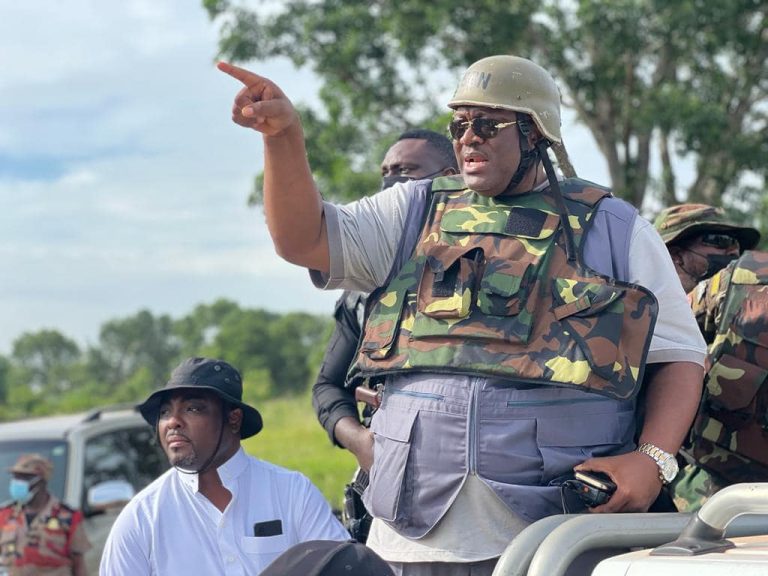 Deputy Minister of Defense, Major Derek Oduro has called for international cooperation to protect shipping routes and marine resources in the Gulf of Guinea.
According to him, the seamless nature of the oceans makes “it difficult for a single nation to do it alone”.
Piracy on Gulf of Guinea comes at a high cost in terms of ransom payment and insurance premium to nations and corporations with interest in the region.
“These huge economic potentials of the Gulf of Guinea are being undermined by myriad of illicit activities,” he explained.
In 2017, piracy is said to have cost West Africa $ 818.8 million in losses, whiles losses in East Africa was estimated at $1.4 billion.
The International Maritime Bureau found that in 2018, the Gulf of Guinea accounted for six hijackings, 13 of the 18 ships fired upon, 130 of the 141 hostages held, and 78 of 83 seafarers kidnapped for ransom worldwide.
At heads of security and naval officers of the G7 friends of the Gulf of Guinea (FoGG) conference in Accra, participants called for collective efforts of states, partners, and stakeholders to tackle the menace.
The conference co-chaired by Ghana and France was to deliberate on the growing cases of piracy, smuggling, human trafficking and destruction of the maritime environment through pollution.
The Gulf of Guinea forms part of the blue economy of international shipping routes, fish resources and oil resources worth trillions of dollars.
On Monday November 4, Togo’s navy and Greek authorities announced that pirates attacked a Greek oil tanker off the coast of Togo and fled after taking four crew members as hostages.
The attack comes days after a similar one in the waters of Benin on November 2, in which nine crew members from a Norwegian shipping vessel were kidnapped.
Prior to the attacks in Benin and Togo, about 62 seafarers had been captured off the coasts of Nigeria, Guinea, Togo, Benin and Cameroon this year.
Deputy Minister of Defense, Major Derek Oduro, underscored the importance of cooperation in policing the Gulf of Guinea.
According to him, the transnational character of the maritime crimes necessitates cooperation of nations sharing boarders with the Gulf of Guinea.
Gulf of Guinea spans the coastline of about 6000 kilometers, stretching from Senegal to the West Angola in the South.
By Paul Selorm Agbo | 3news.com | Ghana]]>
Deputy Minister of Defense, Major Derek Oduro has called for international cooperation to protect shipping routes and marine resources in the Gulf of Guinea.
According to him, the seamless nature of the oceans makes “it difficult for a single nation to do it alone”.
Piracy on Gulf of Guinea comes at a high cost in terms of ransom payment and insurance premium to nations and corporations with interest in the region.
“These huge economic potentials of the Gulf of Guinea are being undermined by myriad of illicit activities,” he explained.
In 2017, piracy is said to have cost West Africa $ 818.8 million in losses, whiles losses in East Africa was estimated at $1.4 billion.
The International Maritime Bureau found that in 2018, the Gulf of Guinea accounted for six hijackings, 13 of the 18 ships fired upon, 130 of the 141 hostages held, and 78 of 83 seafarers kidnapped for ransom worldwide.
At heads of security and naval officers of the G7 friends of the Gulf of Guinea (FoGG) conference in Accra, participants called for collective efforts of states, partners, and stakeholders to tackle the menace.
The conference co-chaired by Ghana and France was to deliberate on the growing cases of piracy, smuggling, human trafficking and destruction of the maritime environment through pollution.
The Gulf of Guinea forms part of the blue economy of international shipping routes, fish resources and oil resources worth trillions of dollars.
On Monday November 4, Togo’s navy and Greek authorities announced that pirates attacked a Greek oil tanker off the coast of Togo and fled after taking four crew members as hostages.
The attack comes days after a similar one in the waters of Benin on November 2, in which nine crew members from a Norwegian shipping vessel were kidnapped.
Prior to the attacks in Benin and Togo, about 62 seafarers had been captured off the coasts of Nigeria, Guinea, Togo, Benin and Cameroon this year.
Deputy Minister of Defense, Major Derek Oduro, underscored the importance of cooperation in policing the Gulf of Guinea.
According to him, the transnational character of the maritime crimes necessitates cooperation of nations sharing boarders with the Gulf of Guinea.
Gulf of Guinea spans the coastline of about 6000 kilometers, stretching from Senegal to the West Angola in the South.
By Paul Selorm Agbo | 3news.com | Ghana]]>
Ghana seeks international collaboration to tackle piracy on the Gulf of Guinea
Reading Time: 2 mins read
Recent Posts
- Survey: NPP’s Chris Arthur projected to win Agona West by landslide
- President Jerry John Rawlings – Four Years On
- Friday, November 8 not a public holiday – Interior Ministry
- Tragic: Speeding NDC vehicle kills the only child of a mother at North Dayi
- Pay NABCO trainees if you care about Ghanaian youth – Mahama tells Bawumia
- Suspend planned strike – FWSC pleads with CLOGSAG
- Some lawyers sacrifice ethics for ‘cheap’ political gains – Attorney-General
- Police ‘waiting for court date’ on Erastus’ case is a lie – Samson Anyenini
Popular Stories
-
Survey: NPP’s Chris Arthur projected to win Agona West by landslide
-
President Jerry John Rawlings – Four Years On
-
Friday, November 8 not a public holiday – Interior Ministry
-
Election 2024: Court issues injunction against Agona West MP, bars her from campaigning
-
US Visa Restriction Policy: A ‘Pilfered Intellectual Property’ of Ghanaian Professor, Rev. Prof. E.Y. Nash

ABOUT US
Newstitbits.com is a 21st Century journalism providing the needed independent, credible, fair and reliable alternative in comprehensive news delivering that promotes knowledge, political stability and economic prosperity.
Contact us: [email protected]
@2023 – Newstitbits.com. All Rights Reserved.











